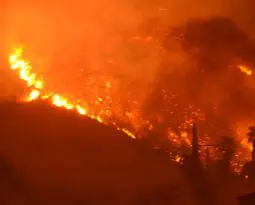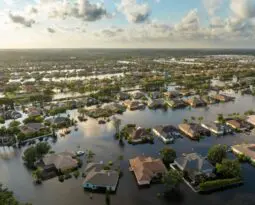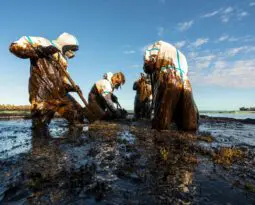Ethics and Climate Change
Selected resources from The Hastings Center.
From Bioethics Briefings:
No issue demands greater care in balancing benefits and risks than responding to the threat of global climate change. Climate change poses significant adverse public health and environmental effects, from increased death, property damage, and water-borne illnesses to increased respiratory illnesses and cardiovascular disease. Most of the moral and policy debate has focused on climate change mitigation policies. Read our briefing to consider the question: what can and should be done to mitigate climate change?
From Hastings Bioethics Forum:
- Now What? Bioethics and Mitigating Climate Disasters
 For those committed to realistic responses to our current climate crisis, the results of the presidential election are a major…
For those committed to realistic responses to our current climate crisis, the results of the presidential election are a major… - Do Your Part to Address Climate Change: Vote
 How we can help reduce emissions at the scale needed to avert the worst of climate change? Vote for leaders who value emissions reduction and carbon neutrality and vote against those who discount, greenwash, or oppose it.
How we can help reduce emissions at the scale needed to avert the worst of climate change? Vote for leaders who value emissions reduction and carbon neutrality and vote against those who discount, greenwash, or oppose it. - Catastrophe Ethics and Charitable Giving
 How can we live a morally decent life in a time of massive, structural threats that seem to implicate us at every turn? Climate change is the paradigm example. Am I permitted to fly? Should I buy an electric car? Go vegan?
How can we live a morally decent life in a time of massive, structural threats that seem to implicate us at every turn? Climate change is the paradigm example. Am I permitted to fly? Should I buy an electric car? Go vegan? - Philanthropy is Not Enough: Oil and Gas Giants Must Consider Medical Ethics
 Given the well-known environmental and health risks of oil and gas drilling, oil and gas giants that enter developing nations routinely offset these risks with charitable investments. Are these investments sufficient? Do the funds go where they are needed? Answering this question raises ethical issues that need greater attention.
Given the well-known environmental and health risks of oil and gas drilling, oil and gas giants that enter developing nations routinely offset these risks with charitable investments. Are these investments sufficient? Do the funds go where they are needed? Answering this question raises ethical issues that need greater attention. - An Evergreen Metaphor: Strachan Donnelley, Dan Callahan, and Environmental Ethics
 The devastation of Hurricane Ida and the global threats of climate change are not on the fringe of bioethics. They call to mind the language of priority-setting typical of bioethics discourse. Who lives and who dies? What can be accomplished with prevention and more levees? And if more are built, how do we set priorities with limited resources?
The devastation of Hurricane Ida and the global threats of climate change are not on the fringe of bioethics. They call to mind the language of priority-setting typical of bioethics discourse. Who lives and who dies? What can be accomplished with prevention and more levees? And if more are built, how do we set priorities with limited resources? - Living Good and Healthy Lives on a Changing Earth: What Should Bioethics Do?
 What does it mean to live well on a warming planet? And as the climate changes, how might health care, education, and other sectors support, or obstruct, our ability to respond? The answers to these profound, and profoundly bioethical, questions will critically influence human well-being in this century and beyond. A group of scientists, educators, and bioethicists convened at The Hastings Center recently to consider these questions and begin an interdisciplinary conversation on how bioethics might address the challenges posed by climate change.
What does it mean to live well on a warming planet? And as the climate changes, how might health care, education, and other sectors support, or obstruct, our ability to respond? The answers to these profound, and profoundly bioethical, questions will critically influence human well-being in this century and beyond. A group of scientists, educators, and bioethicists convened at The Hastings Center recently to consider these questions and begin an interdisciplinary conversation on how bioethics might address the challenges posed by climate change. - Fix the Planet, or Change the Creatures In It?
 Possibly as many as half of the coral reefs that existed 100 years ago have been destroyed, sometimes by removing…
Possibly as many as half of the coral reefs that existed 100 years ago have been destroyed, sometimes by removing… - The Climate Agreement: Understanding, and Leveraging, Public Opinion
 After years of fluctuating and troubled efforts, the nations of the world in December of 2015 came to the remarkable…
After years of fluctuating and troubled efforts, the nations of the world in December of 2015 came to the remarkable…
From Hastings Center Report:
Carbon Emissions from Overuse of U.S. Health Care: Medical and Ethical Problems
First published: 22 August 2022
Abstract:
The United States health care industry is the second largest in the world, expending an estimated 479 million metric tons (MMT) of carbon dioxide per year, nearly 8 percent of the country’s total emissions. The importance of carbon reduction in health care is slowly being accepted. However, efforts to “green” health care are incomplete since they generally focus on buildings and structures. Yet hospital care and clinical service sectors contribute the most carbon dioxide within the U.S. health care industry, with structures/equipment and pharmaceuticals ranking as the third and fourth highest emitters in the industry. Given the magnitude of health care carbon emissions—and the paucity of attention to the carbon of hospital care and clinical services—this essay identifies overuse of health care as a health threat with serious ethical implications, offers a data-driven action plan for carbon reduction in health care, and provides practical suggestions for more sustainable health care delivery in the United States.
On Ethicists and Their Diets
First published: 10 February 2022
Abstract
Factory farming is one of the most destructive institutions in human history. In the United States alone, it raises and kills ten billion animals every year. Conditions in which animals live and the way they are treated in transit are exceptionally cruel. Factory farming is also an environmental disaster. Do ethicists have a greater obligation than the average person to maintain an ethical diet? Various psychological and cultural factors explain why most people in our society regularly consume meat, eggs, and dairy products from factory farms even though there is an overwhelmingly strong case that doing so is wrong. But ethicists are supposed to be good at examining important ethical questions. So, while they have the same obligation as everyone else, ethicists have no excuses for failing to understand dietary ethics and living accordingly.
Essential Reading for Bioethicists in the Anthropocene Era
First published: 13 July 2021
Abstract
The multiple emergencies of global heating require bioethicists to embrace the dormant, comprehensive bioethics legacy of Van Rensselaer Potter, moving beyond the current narrower focus of the field on medicine and health care. We recommend readings that expand the core literature of bioethics to address key environmental issues. These are Jessica Pierce and Andrew Jameton’s The Ethics of Environmentally Responsible Health Care; Dale Jamieson’s Reason in a Dark Time; and David Wallace-Well’s The Uninhabitable Earth. Because efforts to mitigate climate disasters are likely to be only partially successful, we also recommend the teachings of late Roman Stoicism and core texts of Buddhism, which provide ethical wisdom likely to be needed in the multiple crises of the Anthropocene.
Planetary Ethics: Russell Train and Richard Nixon at the Creation
First published: 29 June 2020
Abstract
This piece offers a retrospective review of a plenary speech at the 1969 Annual Meeting of the American Public Health Association by the leading environmentalist of the Nixon administration, attorney and judge Russell Train. Train’s talk, titled “Prescription for a Planet,” can be seen as an early argument for uniting environmental health and public health as the two main determinants of both individual and population health and for the inclusion of these fields in the then-new field of “bioethics.”
Global Climate Change: The Roberts Court and Environmental Justice
First published: 08 February 2012
Abstract
The Roberts Court has become highly activist—not shy about circumventing precedent, invalidating policy decisions by the elected branches of government, and ignoring principles of federalism. The Supreme Court is moving quickly to a doctrine of “constitutionalism in reverse,” protecting the interests of the privileged over the powerless.
In the midst of all this, there was a major victory that may be the most important environmental case ever decided by the Supreme Court.
The Advisory Committee on Human Radiation Experiments
First published: September 1996
Abstract
Like the National Commission and the President’s Commission, the Advisory Committee on Human Radiation Experiments was formed to carry out specific ethical tasks. Yet the committee also had an “openness” mission, a charge to investigate allegations that the U.S. government secretly exposed Americans to environmental releases of radiation. Eighteen months later—and after sixteen public meetings, more than 200 interviews, and the review of about 400,000 documents—the committee delivered a 925-page report to the president.
From The Hastings Center Bioethics Timeline
1984: Publication of Hans Jonas’ The Imperative of Responsibility: In Search of an Ethics for the Technological Age
Precautionary Principle (Vorsorgeprinzip) introduced into English language bioethics and the environmental ethics lexicon in this 1984 book. This principle would become central to the worldwide environmental ethics movement.
H. Jonas, The Imperative of Responsibility: In Search of an Ethics for the Technological Age (Chicago: University of Chicago Press, 1984).
2017: Removal of Science Web Pages by the Incoming Trump Administration
On the day of the 45th presidential inauguration, web pages on health care, civil liberties, climate change, and sexual and gender ethics issues are abruptly removed from the White House web site. And shortly after President Trump takes office, thousands of web pages from science-based federal agencies are taken down and scientists at the Environmental Protection Agency and Department of Agriculture are blocked from communicating with the public and the press about their research. These steps are part of a set of policy initiatives that are widely interpreted as an assault on science by the new administration.
https://www.scientificamerican.com/article/climate-web-pages-erased-and-obscured-under-trump/







